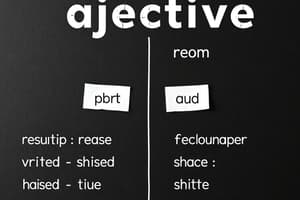Podcast
Questions and Answers
Which technique is most effective for expanding vocabulary retention?
Which technique is most effective for expanding vocabulary retention?
- Learning words in isolation
- Contextual learning (correct)
- Reading newspapers exclusively
- Listening to music only
What type of object is a microwave categorized under?
What type of object is a microwave categorized under?
- Appliance (correct)
- Decor
- Electronics
- Furniture
Which of the following is NOT a suggested strategy for vocabulary enhancement?
Which of the following is NOT a suggested strategy for vocabulary enhancement?
- Using flashcards
- Avoiding new words (correct)
- Practicing vocabulary daily
- Creating word maps
In which room would you typically find a dresser?
In which room would you typically find a dresser?
What is the purpose of using flashcards in vocabulary learning?
What is the purpose of using flashcards in vocabulary learning?
Which of the following is a proper example of a decorative object?
Which of the following is a proper example of a decorative object?
What is a benefit of utilizing language learning apps for vocabulary enhancement?
What is a benefit of utilizing language learning apps for vocabulary enhancement?
Which word describes an object that is smaller in size and easy to carry?
Which word describes an object that is smaller in size and easy to carry?
Flashcards are hidden until you start studying
Study Notes
Vocabulary Enhancement
-
Definition: Vocabulary enhancement involves improving and expanding one's word repertoire for better communication and comprehension.
-
Techniques:
- Reading Widely: Engage with various genres (fiction, non-fiction, poetry) to encounter new words.
- Contextual Learning: Learn words in context rather than in isolation to improve retention.
- Word Maps: Create visual representations of words, including definitions, synonyms, antonyms, and usage examples.
- Flashcards: Use flashcards for frequent revision of new vocabulary.
- Daily Practice: Set a goal for learning a specific number of words each day.
- Use of Apps: Utilize language learning apps (e.g., Duolingo, Anki) for interactive vocabulary practice.
-
Strategies for Retention:
- Mnemonics: Create memory aids to remember complex words.
- Writing Exercises: Incorporate new vocabulary into writing tasks (essays, journal entries).
- Games: Play word games (Scrabble, crossword puzzles) to make learning fun.
Objects in the House
-
Common Objects:
- Furniture:
- Sofa/ couch
- Chair
- Table
- Bed
- Dresser
- Appliances:
- Refrigerator
- Microwave
- Oven
- Washing machine
- Dishwasher
- Decor:
- Painting
- Clock
- Rug
- Curtain
- Vase
- Electronics:
- Television
- Computer
- Speakers
- Lamp
- Phone charger
- Furniture:
-
Categorization:
- Living Room: Sofa, coffee table, television, bookshelf.
- Kitchen: Refrigerator, oven, sink, utensils, dishes.
- Bedroom: Bed, nightstand, dresser, closet, mirror.
- Bathroom: Toilet, sink, shower, towel rack, toiletries.
-
Descriptive Vocabulary:
- Materials: Wood, metal, plastic, glass, fabric.
- Shapes and Sizes: Rectangular, circular, large, small, compact.
- Colors: Blue, red, green, black, white.
-
Functional Vocabulary:
- Use: Sit (chair), store (cabinet), cook (stove), sleep (bed).
- Action Words: Open (drawer), turn on (light), wash (dishes), organize (closet).
Vocabulary Enhancement
- Vocabulary enhancement improves word repertoire for better communication and comprehension.
- Reading widely across genres like fiction, non-fiction, and poetry introduces new words.
- Learning words in context boosts retention rather than memorizing in isolation.
- Word maps visually represent words, detailing definitions, synonyms, antonyms, and usage examples.
- Flashcards facilitate frequent revision of new vocabulary for better memory.
- Setting daily goals for learning new words promotes consistent practice.
- Language learning apps, such as Duolingo and Anki, provide interactive vocabulary practice.
- Mnemonics can help remember complex words through creative memory aids.
- Incorporating new vocabulary in writing tasks, like essays and journal entries, reinforces learning.
- Engaging in word games, such as Scrabble or crossword puzzles, makes vocabulary learning enjoyable.
Objects in the House
- Common household objects can be categorized into furniture, appliances, decor, and electronics.
- Key furniture items include a sofa, chair, table, bed, and dresser.
- Essential kitchen appliances consist of a refrigerator, microwave, oven, washing machine, and dishwasher.
- Decorative items found in a house incorporate paintings, clocks, rugs, curtains, and vases.
- Electronics include a television, computer, speakers, lamp, and phone charger.
Categorization
- Living Room: Common items include a sofa, coffee table, television, and bookshelf.
- Kitchen: Key objects consist of a refrigerator, oven, sink, utensils, and dishes.
- Bedroom: Essential items feature a bed, nightstand, dresser, closet, and mirror.
- Bathroom: Key components are toilet, sink, shower, towel rack, and toiletries.
Descriptive Vocabulary
- Materials describing objects may include wood, metal, plastic, glass, and fabric.
- Shapes and sizes of items are labeled as rectangular, circular, large, small, and compact.
- Common colors include blue, red, green, black, and white.
Functional Vocabulary
- Action words associated with use include sit (chair), store (cabinet), cook (stove), and sleep (bed).
- Action verbs for tasks include open (drawer), turn on (light), wash (dishes), and organize (closet).
Studying That Suits You
Use AI to generate personalized quizzes and flashcards to suit your learning preferences.




